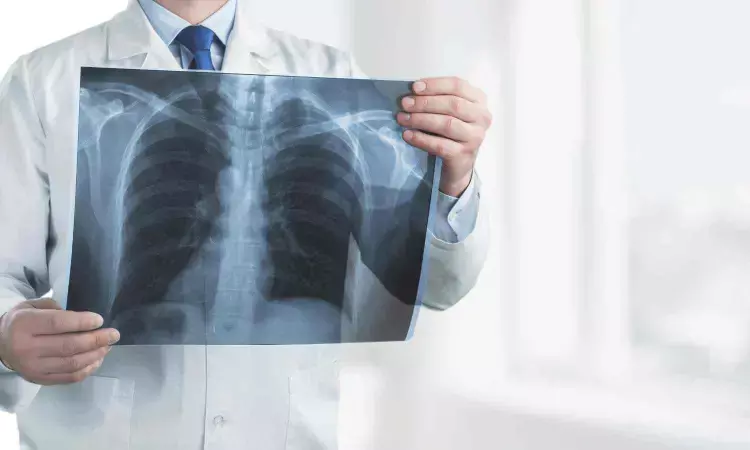- Home
- Medical news & Guidelines
- Anesthesiology
- Cardiology and CTVS
- Critical Care
- Dentistry
- Dermatology
- Diabetes and Endocrinology
- ENT
- Gastroenterology
- Medicine
- Nephrology
- Neurology
- Obstretics-Gynaecology
- Oncology
- Ophthalmology
- Orthopaedics
- Pediatrics-Neonatology
- Psychiatry
- Pulmonology
- Radiology
- Surgery
- Urology
- Laboratory Medicine
- Diet
- Nursing
- Paramedical
- Physiotherapy
- Health news
- Fact Check
- Bone Health Fact Check
- Brain Health Fact Check
- Cancer Related Fact Check
- Child Care Fact Check
- Dental and oral health fact check
- Diabetes and metabolic health fact check
- Diet and Nutrition Fact Check
- Eye and ENT Care Fact Check
- Fitness fact check
- Gut health fact check
- Heart health fact check
- Kidney health fact check
- Medical education fact check
- Men's health fact check
- Respiratory fact check
- Skin and hair care fact check
- Vaccine and Immunization fact check
- Women's health fact check
- AYUSH
- State News
- Andaman and Nicobar Islands
- Andhra Pradesh
- Arunachal Pradesh
- Assam
- Bihar
- Chandigarh
- Chattisgarh
- Dadra and Nagar Haveli
- Daman and Diu
- Delhi
- Goa
- Gujarat
- Haryana
- Himachal Pradesh
- Jammu & Kashmir
- Jharkhand
- Karnataka
- Kerala
- Ladakh
- Lakshadweep
- Madhya Pradesh
- Maharashtra
- Manipur
- Meghalaya
- Mizoram
- Nagaland
- Odisha
- Puducherry
- Punjab
- Rajasthan
- Sikkim
- Tamil Nadu
- Telangana
- Tripura
- Uttar Pradesh
- Uttrakhand
- West Bengal
- Medical Education
- Industry
Increased use of chest x-rays linked to earlier lung cancer diagnosis and improved survival: Study

A groundbreaking study has revealed a significant link between the frequency of chest x-ray referrals from GPs and earlier diagnosis and improved survival rates for lung cancer patients.
Research from the University of Sheffield analysed records from more than 170,000 lung cancer patients in England between 2014 and 2018, combined with chest x-ray rates from 7,400 GP practices.
The study, published in the British Journal of General Practice, found that patients attending practices with the highest chest x-ray usage were more likely to be diagnosed with lung cancer at an earlier, more treatable stage. The practices with the highest chest x-ray usage also saw patients less likely to be diagnosed at the later stages of cancer - stage three and four.
These patients were also shown to have better survival at both one and five years after diagnosis, compared with those with the lowest chest x-ray usage.
Lead author of the study, Dr Stephen Bradley from the University of Sheffield’s School of Medicine and Population Health, said: “Lung cancer remains the leading cause of cancer deaths both in the UK and globally. This is an important step forward in our understanding of how to improve lung cancer detection.
“Our research strongly suggests that increasing the use of chest x-rays for patients with relevant symptoms can lead to earlier diagnosis and, crucially, better chances of survival.”
Dr Bradley, who conducted the study whilst at the University of Leeds, added: “While advanced technologies like CT scanners play a vital role, this study highlights the potential for optimising the use of a simpler, cheaper tool like x-rays which are more easier for patients to access.
"By encouraging greater use of chest x-rays, we can potentially diagnose lung cancer earlier, when treatment is more likely to be successful."
Until now, it was not widely understood if GPs arranging more chest x-rays was beneficial. The uptake of chest x-rays varies a great deal between different GP practices - possibly in part because GPs may not have been convinced that there could be a benefit for patients with very common symptoms.
Co-author of the study, Willie Hamilton CBE, Professor of Primary Care Diagnostics at the University of Exeter, said: “This study matters. There’s few cancer tests available in general practice which are fairly accurate, fairly cheap and very acceptable to patients. Now we know that doing more chest X-rays finds more cancers, and identifies them earlier in their growth, which is crucial to the best outcomes for patients.”
This is the first study of its kind which links chest x-ray rates and the national cancer registry. The study was funded by Cancer Research UK.
Lyndsy Ambler, Senior Strategic Evidence Manager at Cancer Research UK, said: “This study highlights how the use of investigations in primary care can help diagnose cancer at an earlier stage to give people affected by cancer the best chance of a good outcome.
“Encouraging the use of chest x-ray for people with potential signs and symptoms of lung cancer by GPs and improving GP access to investigations is key.
“More research to understand the impact of other investigations used in primary care on patient outcomes is also needed to support efforts to diagnose cancer earlier.”
Reference:
Stephen H Bradley, Richard D Neal, Matthew EJ Callister, General practice chest X-ray rate is associated with earlier lung cancer diagnosis and reduced all-cause mortality: a retrospective observational study, British Journal of General Practice, DOI: https://doi.org/10.3399/BJGP.2024.0466
Dr Kamal Kant Kohli-MBBS, DTCD- a chest specialist with more than 30 years of practice and a flair for writing clinical articles, Dr Kamal Kant Kohli joined Medical Dialogues as a Chief Editor of Medical News. Besides writing articles, as an editor, he proofreads and verifies all the medical content published on Medical Dialogues including those coming from journals, studies,medical conferences,guidelines etc. Email: drkohli@medicaldialogues.in. Contact no. 011-43720751


